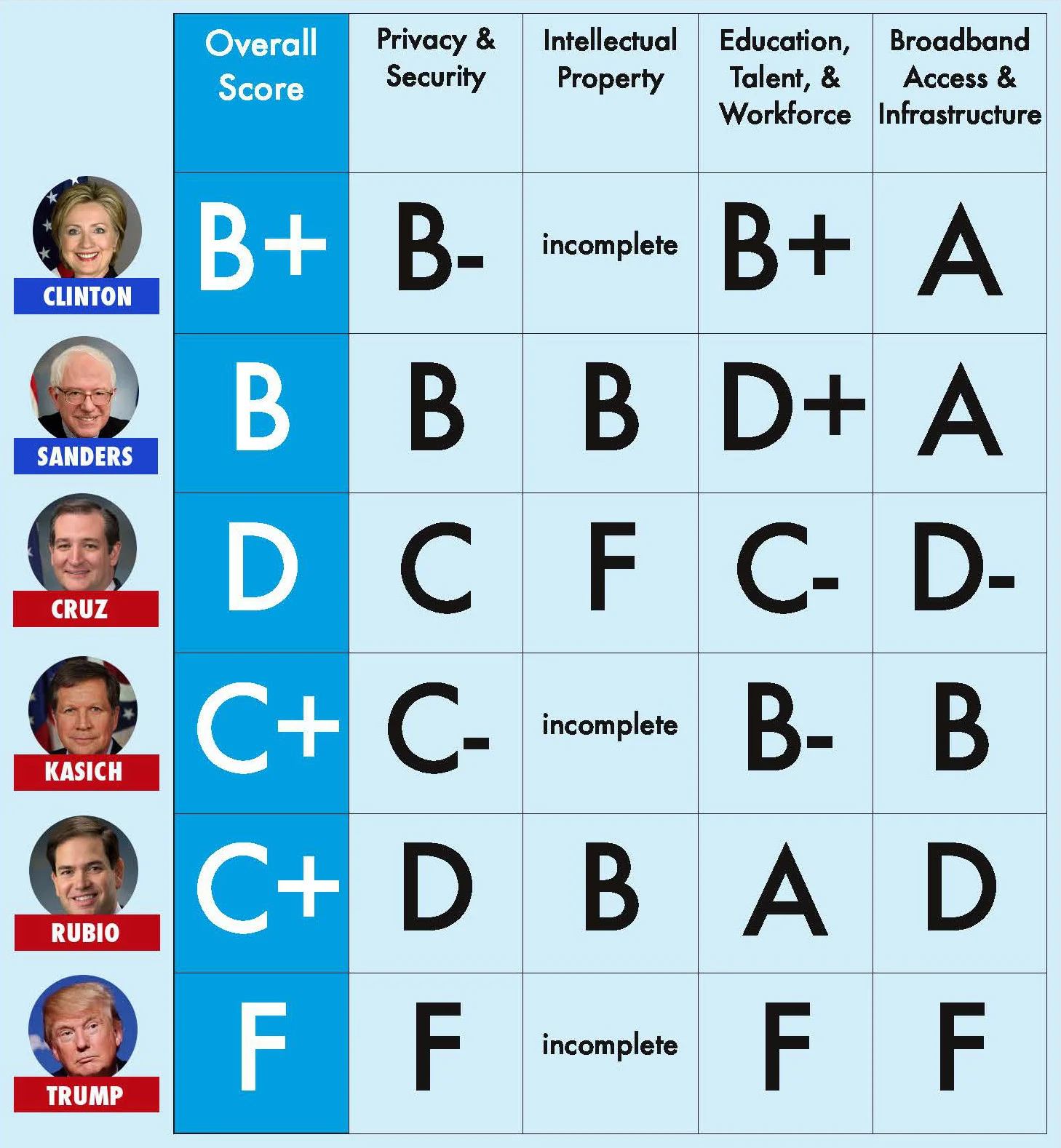by Anna Duning
Recent headlines from around the country suggest that Silicon Valley has united against Trump. “Silicon Valley Finds Trump’s Disruption Unwelcome,” states the New York Times; “Trump candidacy unites Silicon Valley — in horror,” proclaims the Seattle Times. Citing disdainful quotes from prominent Silicon Valley executives and venture capitalists and reporting on the paltry sums Trump has raised from employees of major tech companies, many media outlets have concluded this community of technologists has galvanized against the presumptive Republican nominee. This may be the case, but these stories tend to overlook what the Trump presidency could mean, not just to Silicon Valley VCs and execs, but to the wider startup and technology community that reaches far beyond the geographic boundaries of Silicon Valley.
In addition to analyzing what influential venture capitalists and executives have to say about Trump, it’s just as important we take a close look at the issues and positions that impact the industry at large, from the major tech firms headquartered in the Valley to the single-person startups building new technologies and services in cities around the country.
With Clinton securing the Democratic nomination this week and the party’s nominees basically solidified, let’s take a look back at the analysis Engine, in partnership with Tusk Ventures, undertook just a few months ago, when the list of candidates was much longer.
Hillary Clinton received the highest grade, though not a perfect score, of any candidate in either party, with a “B+.” Clinton has been rhetorically supportive of technology and the tech community’s priorities, though she has not made explicit public statements during this current campaign on several of the most important tech issues (such as patent reform and high-skilled immigration). In other cases, she’s opted for cautious, non-committal approaches, including on encryption, stating, “Maybe the back door isn't the right door, and I understand what Apple and others are saying about that...I just think there's got to be a way,” a notion that tech experts consider unfeasible. Even in the absence of concrete policy proposals to help the tech sector, merely talking in positive terms about tech issues puts Clinton near the top of the class on this scorecard, which is far more of an indictment of the other candidates than a positive reflection of her policy agenda.
Clinton does have a strong record on broadband access policy. She’s been a longtime proponent of net neutrality. Expanding internet access abroad was a pillar of her diplomacy strategy as Secretary of State and she’s committed to having 100 percent of American households online by 2020.
It also appears the Clinton team is interested in building on President Obama’s legacy when it comes to technology. Politico reported this week that her team is “quietly assembling a roster of high-powered tech and telecom advisers,” to develop her digital agenda with a focus on protecting net neutrality and modernizing government.
Donald Trump, meanwhile, received the lowest grade—a failing “F”—of any candidate based on our analysis of his positions (or lack thereof) on tech issues. On high-skilled immigration, Trump’s position wavers: he’s been an outspoken opponent of the H-1B visa program, though in one debate conceded, “We need highly-skilled people in this country.” Overall, his campaign has largely avoided substantive policy discussions to date, and since he has never held political office, he predictably received the most “incompletes” of any candidate in our scorecard, failing to offer any policy agenda related to patent reform, STEM education, and broadband access.
When Trump has talked about tech issues, he has done so in the only way he knows how: brashly and inaccurately. Trump has attacked net neutrality as an attempt by President Obama to control conservative media, even though the FCC (the body that actually passed net neutrality rules) has absolutely no authority under the Open Internet Order to regulate media content. Trump called for a boycott of Apple unless it helped the FBI crack the iPhone used by one of the San Bernardino shooters, though he revealed his lack of understanding of the issue by claiming that Apple should “give [the FBI] that security number,” apparently believing that Apple was merely withholding the passcode to the phone. This technological illiteracy may come as no surprise, considering Trump also once claimed he would combat militant extremism online by talking to Bill Gates about “closing that internet up in some ways.”
Although Trump has not made any specific statements about online speech, current members of Congress have expressed worry that as president, Trump would likely veto a proposed bill that protects online speech. Given Trump’s history of litigation against individuals who’ve spoken badly about him, lawmakers expect Trump would oppose anti-SLAPP legislation that makes it harder to sue (or threaten to sue) people for statements they make online.
While the GOP’s nominee himself has not yet shown much interest in tech issues overall, the Republican National Committee has reached out to industry groups for input. Earlier this week, the RNC held a closed-door “tech and innovation listening session.” The party is evidently hoping to formulate a platform that includes some of the issues most salient to the tech community.
We’ll likely have to wait until the July convention to find out whether and how these issues become part of Trump’s agenda, and whether we can update his grade from an “F”. And even then, both candidates will still have five more months to further develop and enhance their technology and startup policy agendas. We’ll be tracking.


